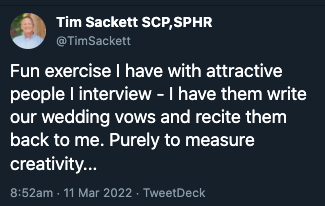Do you know what it felt like the last time you fell in love?
I mean, real love?
The kind of love where you talk 42 times per day, in between text and Facebook messages, and feel physical pain from being apart? Ok, maybe for some, it’s been a while, and you didn’t have the texts or Facebook! But, you remember those times when you really didn’t think about anything else or even imagine not seeing the other person the next day, hell, the next hour. Falling “in” love is one of the best parts of love; it doesn’t last that long, and you never get it back.
I hear people all the time say, “I love my job,” and I never used to pay much attention; in fact, I’ve said it myself. The reality is that I don’t love my job. I mean, I like it a whole lot, but I love my wife, I love my kids, and I love Diet Mt. Dew at 7 am on a Monday morning. The important things in life! But my job? I’m not sure about that one. As an HR Pro, I’m supposed to work to get my employees to “love” their jobs. Love.
Want to know the difference between like and love? The next time your significant other tells you, “I love you!” just say in return, “Yeah, I like you as well!” Then get ready for an argument!
Let me go all Dr. Phil on you for a second. Do you know why most relationships fail? No, it’s not cheating. No, it’s not the drugs and/or alcohol. No, it’s not money. No, it’s not that he stops caring. No, it’s not your parents. Ok, stop it. I’ll just tell you!
Relationships fail because expectations aren’t met. It seems logical knowing what we know about how people fall in love and lose their minds. Once that calms down, the real work begins. So, if you expect love to be the love of the first 4-6 months of a relationship, you’re going to be disappointed a whole bunch over and over.
Jobs aren’t much different.
You get a new job, and it’s usually really good! People listen to your opinion. You seem smarter. Hell, you seem better looking (primarily because people are sick of looking at their older co-workers). Everything seems better in a new job. Then you have your one-year anniversary, and you come to find out you’re just like the other idiots you’re working with.
This is when falling in love with your job really begins. When you know about all the stuff, the company hid in the closet. The past employees they think are better and smarter than you, the good old days when they made more money, etc. Now is when you have to put some work into making it work.
I see people all the time moving around to different employers and never seeming to be satisfied. They’re searching. Not for a better job or a better company. They’re searching for that feeling that will last. But it never will, not without them working for it.
The best love has to be worked for. Passion is easy and fleeting. Love is hard to sustain and has to be worked on, but it can last forever.


